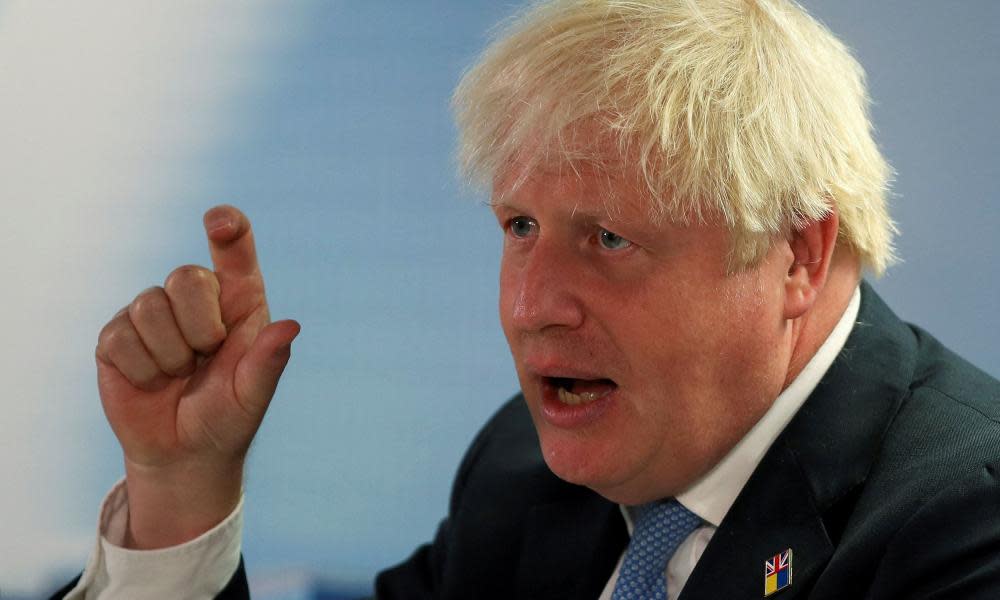Boris Johnson hails blockchain ‘possibilities’ at Singapore conference

Boris Johnson has given a speech to a conference on blockchain, the technology behind cryptocurrency, as part of his lucrative post-No 10 lecture circuit, despite controversy around the industry following the multibillion-dollar collapse of the FTX exchange.
In his speech, the former prime minister suggested the advent of blockchain was full of possibilities and appeared to compare it to major technological innovations such as the invention of fire, the railways, and the internet.
But Johnson also said he supported the idea of more regulation of cryptocurrencies and argued that its advocates “have to convince people that their use cases are real and work for them in their lives, opposed to this being about speculation and a new type of financial market or instrument”.
“When there is a mania and a bubble, when you have speculators driving up prices by finding a wider pool of people to exploit, you do need measures to protect the public from Ponzi schemes,” he said.
Johnson has not yet declared how much he was paid for the speech or who funded it and his trip to Singapore, where he disclosed he was staying in the five-star hotel Raffles, which can cost £1,000 a night.
It comes after he was paid £276,130 from the Council of Insurance Agents & Brokers for another speech in the US. He has also taken almost £40,000 of free accommodation from the family of Anthony Bamford, a major Conservative party donor, £11,560 of hospitality from Rupert Murdoch in the US and £10,000 of hospitality at Heathrow airport’s royal suite.
Blockchain technology is used to provide a secure way of making and recording transactions, most commonly for the cryptocurrency bitcoin.
It is largely unregulated but it has come under intense scrutiny from governments in recent weeks following the demise of one of the world’s largest cryptocurrency exchanges, FTX, leaving thousands frozen out of their savings. The value of the best-known cryptocurrency, bitcoin, has also plunged.
Many cryptocurrency giants have been arguing in favour of regulation but some governments and regulators fear that this would give it status and credibility by putting it on a par with traditional finance.
This week, the European Central Bank said bitcoin is on an “artificially induced last gasp before the road to irrelevance”, in a scathing intervention arguing against giving regulatory legitimacy to the cryptocurrency.
However, supporters of the technology include the new prime minister, Rishi Sunak, who has previously said he wants to make the UK a global hub for cryptoasset technology and investment.
Matt Hancock, the former health secretary, has also vocally supported the technologies behind cryptocurrency, and took £11,638 of hospitality to attend a cryptocurrency conference called Permissionless in Florida, as well as £10,000 to speak at a fintech conference called LendIt.
Speaking at the International Symposium on Blockchain Advancements (ISBA) in Singapore, Johnson described the room of blockchain enthusiasts as “pioneers at the cutting edge of a new and still infant technology whose possibility the whole world is struggling to assess”, adding: “Given the huge controversies of some use cases … and given all the delicacies and sensitivities, I will do my best to tiptoe through the minefield with the tact for which I am famed.”
He also urged them, as “innovators everywhere [do], with the possible exception of Singapore, come to London, come to the UK”.
Johnson said technology was “morally neutral” and scepticism about its uses were “generally wrong”. He also said the “blockchain idea seems to me to have all sorts of possibilities to allow people to deal with people without a third party to authenticate”, but he drew a distinction between the technology and its use through cryptocurrencies.
On cryptocurrencies, he said his question was “who is in charge of the clattering train, because I’ve seen some pretty shocking headlines about this whole venture and I think we are going to need to have some way of holding people to account”.
“If it’s going to succeed and if it’s going to build trust, then it’s obviously got to be regulated in such as way to command confidence in such a way as to visibly protect all participants,” Johnson said.
He said a better relationship between the cryptocurrency industry and politicians “would have to happen if this thing has a future”.
Johnson also gave his views on Twitter, saying it could be an “intimidating environment for politicians” and “pile-ons” were like “nothing they had been prepared for”.
He said a “twitstorm can flare up like a typhoon in the south China seas and cause your plane to buffet but it doesn’t really reflect what’s going on in the rest of the world”. However, he said politicians would need to “learn to have thicker skins about it” and find “ways of doing it without feeling beaten up – I don’t read much of it”.

 Yahoo News
Yahoo News 
